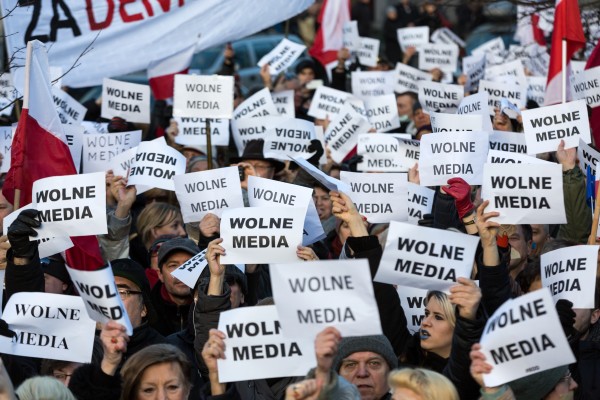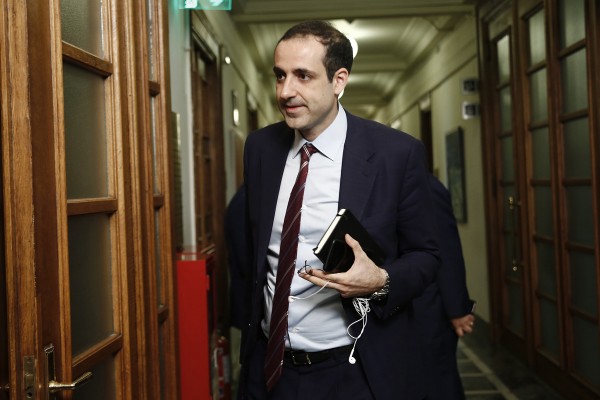International Press Institute (IPI) Senior Press Freedom Adviser Steven M. Ellis and South East Europe Media Organisation (SEEMO) Secretary General Oliver Vujovic travelled to Istanbul this week to speak before the second Congress of the Freedom for Journalists Platform (Gazetecilere Özgürlük Platformu – GÖP), an umbrella group representing press freedom and free expression groups across Turkey.
The full text of Ellis’ remarks, delivered this morning, appears below.
***********************************************************
Thank you all very much. I would like to thank the Freedom for Journalists Platform and IPI’s Turkish National Committee for having me here.
Good morning everyone. My name is Steven Ellis.
I’ve had the pleasure of meeting a number of you here, although I wish I could have done so under different circumstances. For those of you who I have not met, I’m a senior press freedom adviser with the International Press Institute.
IPI represents journalists in 120 countries around the world and has fought for media freedom for more than 60 years. I’m here today to demonstrate IPI’s solidarity with Turkish journalists. To show you, and the government, and the Turkish people, that the world is watching, and cares about what is happening here.
Turkey has seen dramatic developments in recent years. Yours is a vibrant media scene, with viewpoints from across the political spectrum. But that vibrancy has often hidden a dark undercurrent. One that saw too many journalists killed in connection with their work in recent decades.
Thankfully, according to our records, no journalists have been murdered in Turkey for their work in at least three years. But that is small comfort when we look at what recent years have brought.
Creeping self-censorship, as journalists choose between doing their job or losing it. Criminal charges and lawsuits in reply to criticism, instead of counter-arguments. Raids on homes and offices and, at one point, more-than 100 journalists labelled terrorists and thrown into prison to wait years for trial.
In just the last two months we’ve seen the disconnect between the people in the streets and penguins on the television screens. Paranoid accusations of global conspiracies, as though anyone with a different point of view must be a foreign dupe, or worse. Water cannons, tear gas, police batons and rubber bullets raining down on journalists.
Some say that supporting those who expose problems or uncomfortable truths is “against Turkey”. To that, I argue that a state that cannot bear any scrutiny or acknowledge any misstep, that cannot look in the mirror and say “we can do better and we must do better”, is the greatest threat to its own long-term survival.
But in any case, labelling those of us here “enemies” of Turkey could not be more wrong. I’m here as part of IPI, an organisation representing journalists around the world, including journalists in Turkey. IPI is neutral. We don’t favour one political party over another. Our record is a history of independence and a history of working to bring parties together to raise them both up, not tear one down.
IPI and its National Committee have worked here in Turkey to speak with journalists about the problems they face and to press that those who attack or murder journalists be held accountable. We’ve been to prisons and attended trials to show our support for due process when journalists were accused of crimes.
Our members around the world have written to the president and the prime minister, and spoken directly with Turkey’s ambassadors abroad, to press for the release of imprisoned journalists. We’ve worked with the Council of Europe and the European Commission to ensure they continue to focus on press freedom in Turkey.
And IPI and its National Committee have always sought to engage the government, to take part in a dialogue for the benefit of everyone in Turkey. In fact, an IPI delegation in December met with the deputy prime minister. He said that a new legislative package would address press freedom violations and lead to the release of imprisoned journalists.
We’re still waiting.
Nevertheless, our efforts, in connection with those of the Freedom for Journalists Platform and the work of so many others, helped lead to the release of imprisoned journalists. And while the situation remains dire, our efforts, and your efforts, have led to continuing international attention. They’ve brought a spotlight that perhaps caused those who would crack down even further to hesitate.
We have stood with our National Committee year after year to show the world what is happening here, and we keep coming back. We are here today, calling on the government to respect the fundamental role of journalists in a democracy, and we will be here again.
Not to intervene or interfere, but solely to fight for the Turkish people’s right to know. Their right to receive knowledge and to use it to make conscious, informed decisions about their lives. A right without which the vote – that essential element of democracy – is meaningless.
Each day our worlds are bound more tightly together. The world has an impact on Turkey, and Turkey on the rest of the world.
In the last two months, the world has watched your country to see what comes next. The world has watched with apprehension, with fear, and sometimes with outrage.
But also with amazement, with admiration, and with hope.
We know that your situation remains incredibly difficult. Some 64 of your colleagues remain imprisoned. You labour under ambiguous laws that leave you exposed to prison time or exorbitant fines. You face violence reporting from the streets and many of your leaders express disdain or even contempt for your profession.
We also know that these problems will not be fixed immediately, and that we must to continue to fight to protect independent journalism.
But the last few months have shown us that something has changed. The powerful remain powerful, but the veneer of omnipotence, of invulnerability – the sense that they can do whatever they want and that it is useless to challenge them – has cracked.
We saw it when people across the country stood up – stood up and said: “No, this is not acceptable.” When they said: “No, stability doesn’t mean that we have to give up our liberty.” When they said: “No, we will decide our own destiny.”
We know that we will need to continue to fight and to do so desperately. But despite the fight ahead of us, something changed, and we know things will never be quite the same again.
So, at this second Congress of the Freedom for Journalists Platform: on behalf of IPI and its members around the world, we share with you our admiration for your struggle and our determination to help you carry it forward.
Turkey can be a land of both prosperity and freedom. And we will stand with you to see it.


